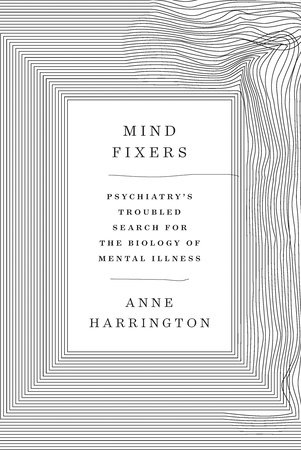For the longest time I’ve been looking for an impossible book: an historic exploration of psychiatry and psychology over the last 150+ years that lays the groundwork of how we got to where we are (with the infighting, the arrogant spectacles, the tentacles of private interests), that also isn’t painfully academic or with too little (or too much) of the author’s own perspective of such a unwieldy topic. Well, as I said, it doesn’t exist, but Anne Harrington’s Mind Fixers comes very close.
As the subtitle states, Harrington (a science historian and the Franklin L. Ford Professor of the History of Science at Harvard University) has her lens steadied on the search for the (real, perceived, and ultimately elusive) biological underpinnings of mental health conditions. This is a terribly important topic and if this book has not ignited the debate it might have, it’s no reflection on the scholarship or insights gleaned from Mind Fixers, but perhaps a victim of timing and not being the loudest possible controversy to be found on Twitter. Even then, if you follow psychologists, psychiatrists, and those who specialize in related research on Twitter you’ll soon find yourself inundated with accusations of anti-psychiatry levelled at those who criticize prevailing notions of mental illness being caused by chemical imbalances in the brain, while the replication crisis undermines many of the foundations of Psychology 101.
If there’s a story here, it’s one of shifting hegemonies: from those who were concerned of their patient’s physical wellbeing, to those concerned with their brains, from those concerned about subconscious maternal conflict to those convinced the answer was in our brains, but only chemically. And with each shift in search of a possible answer to mental suffering there are reciprocal shifts in public investment and, eventually, interest from pharmaceutical companies. And at the end of the day what shifts the most are some of the most vulnerable people in our society: from sanitariums to hospitals; from wartime battlefields to community centres…only to be dumped onto the streets. It’s all here in Mind Fixers, and it’s a timely read considering the vested interests currently luring large investments in brain science, or in such promised but potentially dangerous remedies as ketamine, or those convinced of a genetic pathology. And if it sounds as if this book is strictly for history/psychiatry wonks you are dead-wrong.
What Harrington does very well is take reams of historical information and distill it into a narrative that ultimately maps out how those with what is generally called (though I hold some hesitations at times) mental illness were treated and what those in their charge felt was at play inside their bodies. Along the way we see ethical lapses in the form of wholesale human experimentation (i.e. injecting unknowing patients with blood infected with malaria), as well as the overreaching ideal of Freudian psychoanalysis as a Rosetta stone. Along the way we are introduced to ideas and theories which seemed to make sense at the time — narcosynthesis, insulin coma therapy — along with travesties such as deinstitutionalization, basically the dumping of people with mental health issues on the streets as a result of overambitious government policy that was out of sync with the realities of state coffers. Mind Fixers is also blunt about the influence of pharmaceutical companies, who increasingly figure in the narrative; the last quarter of the book is an admonishment of the profiteering that took place from the mid-1980s to the mid-00s as companies such as Eli Lilly were able to advertise directly to Americans and, with the help of an increasingly subjective DSM that allowed two people with completely different symptoms to be diagnosed with the same disease, exponentially increase their profits through prescriptions.
There are some issues. Repeatedly, Harrington refers to the “neo-Freudians” who, in their day (mid-20th century), held the reins of power with respect to diagnosis and how psychiatric trends were approved. There is a lot of confusion (just look at the definition provided on this U of C Berkeley page) about what a neo-Freudian is: those who studied but ultimately disagreed with Freud (however kept his strictly psychodynamic approach) or those who held Freudian views but refused to downgrade the role of biological processes? It may sound semantic, but in lieu of a definition the term’s repeated use without context begs for clarity. In the process it also makes it sound as if all psychoanalysts were in some way Freudian adherents. What about Melanie Klein and the rest of the object-relations movement? How did they differ? Indeed, the role of plain ol’ talk therapy — explicitly Freudian or not — is given short shrift, which might sound understandable in a book looking at biological underpinnings, but as a tool in the arsenal against so-called mental illness its absence feels odd, especially in light of the author’s emphasis on the misdirections of neo-Freudians. I get that Harrington could easily have written a book three times its size on her chosen topic. But if you’re going to talk about the influence of Freud and psychoanalysis in general then I feel you have to unpack and contextualize a bit more than what is on display here.
For the most part, however, Harrington is surprisingly fair-minded, not only unveiling the naked greed (and capricious biological arguments) of psychopharmaceutical manufacturers, but highlighting the testimony of those patients who were — placebo effect or not — helped by their medications, even if it came at a cost of other aspects of their health. She is by no means on a mission to dispel the notion of a biological source of mental illness, as I’m sure some vested interests might think looking at her book from a distance, but rather to show how partisanism, arrogance, and greed have wasted decades of valuable mental health research as we swing from trend to trend.
Mind Fixers: Psychiatry’s Troubled Search for the Biology of Mental Illness, is available at an independent bookseller near you, or online.


